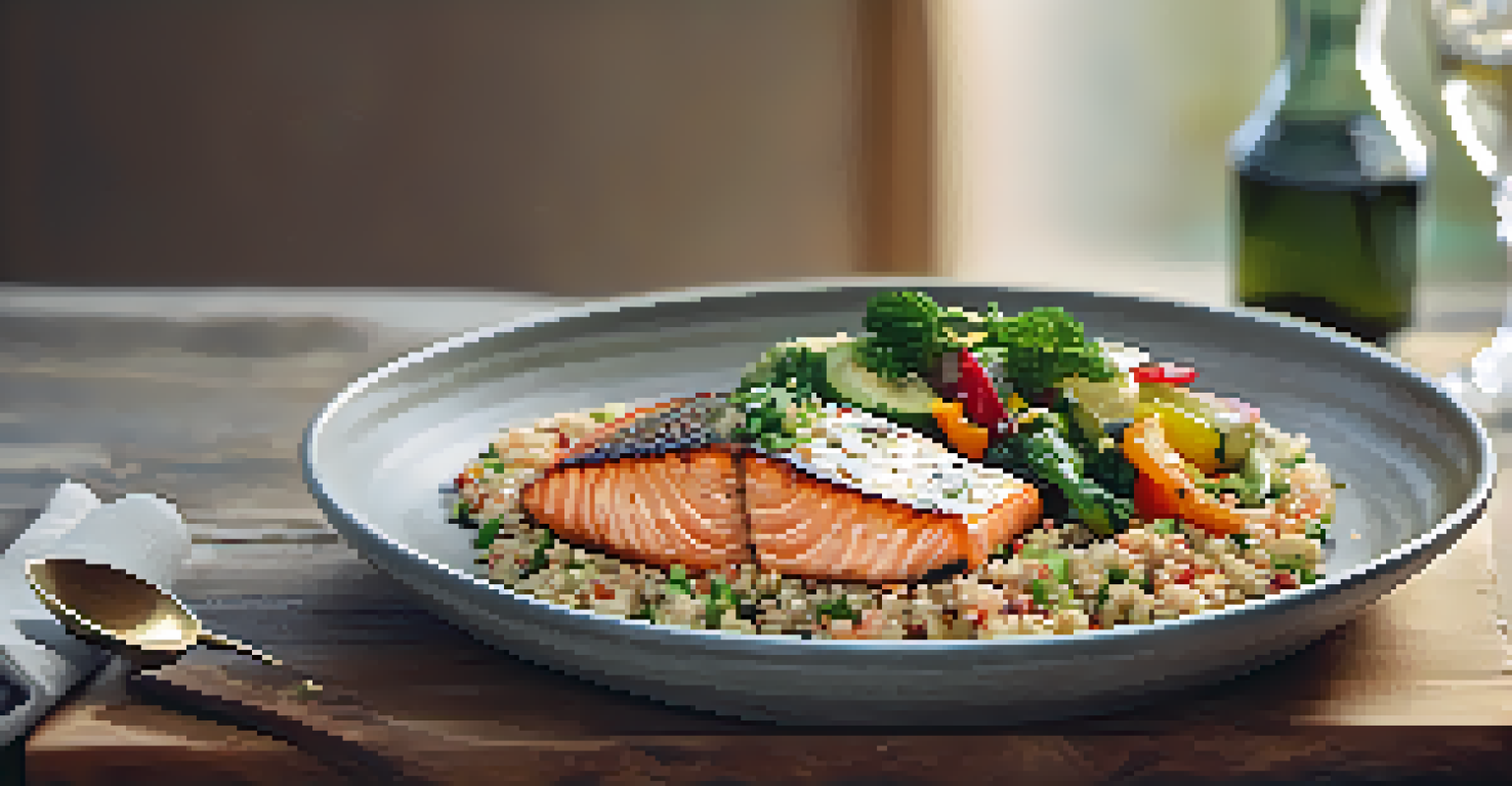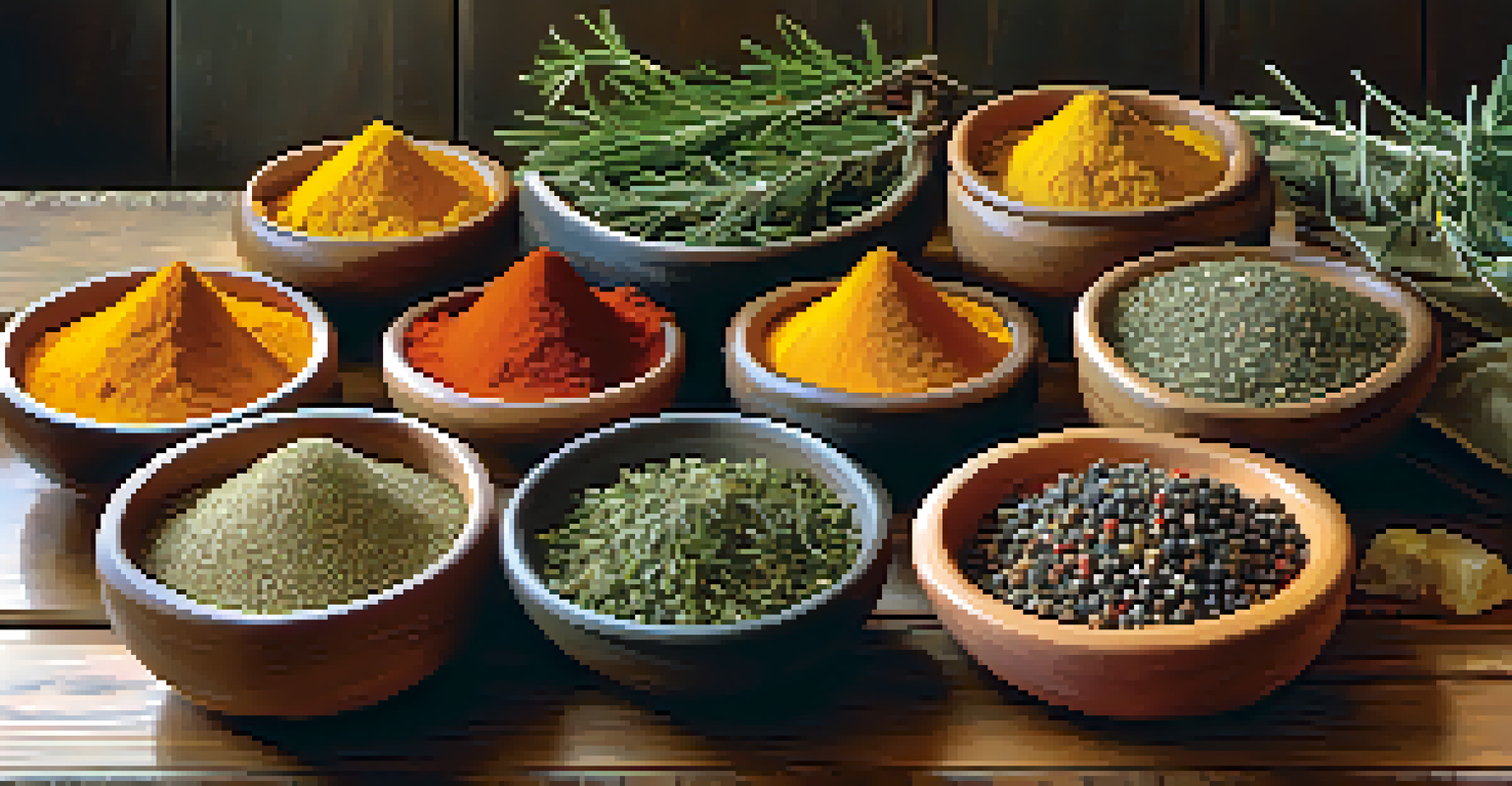Culinary Medicine: A Guide to Functional Foods

What is Culinary Medicine and Why It Matters
Culinary medicine blends the art of cooking with the science of nutrition, creating a holistic approach to health. It emphasizes using food as a tool for prevention and treatment of diseases. This practice encourages individuals to make informed food choices that can enhance their well-being.
Let food be thy medicine and medicine be thy food.
By understanding the nutritional value of ingredients, we can transform our meals into powerful allies in maintaining health. Culinary medicine empowers us to take control of our diets, allowing for a proactive stance against various health issues. Imagine cooking a delicious dish that not only satisfies your taste buds but also boosts your immune system!
As we delve deeper into this topic, you'll discover how functional foods play a crucial role in culinary medicine. These foods provide health benefits beyond basic nutrition, making them essential for anyone seeking to improve their overall health through diet.
Understanding Functional Foods: More Than Just Nutrition
Functional foods are those that provide additional health benefits beyond their basic nutritional value. Think of them as superheroes of the food world—packed with vitamins, minerals, and other bioactive compounds that can support your health. Examples include foods rich in antioxidants, probiotics, and omega-3 fatty acids.

These foods can help reduce the risk of chronic diseases, improve gut health, and promote overall wellness. For instance, including more berries in your diet can enhance your antioxidant intake, while yogurt can support digestive health through its probiotic content. It's all about making simple changes that can lead to significant health improvements.
Culinary Medicine Combines Food & Health
Culinary medicine merges cooking and nutrition, empowering individuals to use food as a means to enhance their overall health and prevent diseases.
As we explore functional foods further, you'll see how they can be seamlessly integrated into your daily meals. Whether it's swapping out refined grains for whole grains or adding a handful of nuts to your snacks, small adjustments can make a big difference in your health journey.
Key Functional Foods to Incorporate into Your Diet
When it comes to functional foods, variety is key! Some top choices include leafy greens, berries, nuts, seeds, fatty fish, and whole grains. Each of these foods brings unique health benefits, contributing to a balanced diet that supports optimal health.
The doctor of the future will no longer treat the human frame with drugs, but rather will cure and prevent disease with nutrition.
For example, leafy greens like spinach and kale are rich in vitamins C and K, while fatty fish such as salmon provide essential omega-3 fatty acids that can reduce inflammation. Incorporating a rainbow of fruits and vegetables into your meals not only makes them visually appealing but also enhances their health benefits.
Don't be afraid to experiment with these foods in your cooking! Try adding chia seeds to your smoothies or topping your salads with a variety of nuts for a satisfying crunch. Each small step you take towards including more functional foods in your diet can lead to significant health gains.
The Role of Cooking Techniques in Culinary Medicine
How we prepare our food can significantly impact its nutritional value. Cooking techniques like steaming or roasting can help retain the nutrients in vegetables, while frying may diminish their benefits. Learning the best methods to prepare functional foods is part of the culinary medicine approach.
For instance, steaming broccoli can preserve its vitamins, while sautéing garlic can enhance its health benefits by releasing beneficial compounds. It's not just about what you eat, but also how you cook it that matters in culinary medicine.
Functional Foods Boost Wellness
Incorporating functional foods, like berries and fatty fish, can significantly improve health by providing additional benefits beyond basic nutrition.
By adopting healthier cooking techniques, you can maximize the nutritional content of your meals. This knowledge empowers you to create dishes that are not only tasty but also packed with health-promoting properties.
Creating Balanced Meals with Functional Foods
A balanced meal incorporates a variety of food groups, and functional foods can play a significant role in achieving this balance. Aim for a plate that includes lean proteins, whole grains, healthy fats, and plenty of fruits and vegetables. This combination ensures a wide range of nutrients and health benefits.
For example, consider a meal of grilled salmon (rich in omega-3s), quinoa (a whole grain), and a colorful vegetable stir-fry. This meal not only provides essential nutrients but also supports heart health and overall well-being. It's about finding the right combinations that work for your taste buds and health goals.
Planning balanced meals with functional foods can be a fun and creative process. Experiment with different ingredients and cooking styles to discover what you enjoy most, making healthy eating an exciting part of your daily routine.
The Power of Herbs and Spices in Culinary Medicine
Herbs and spices are often overlooked, yet they can provide a plethora of health benefits. These flavorful additions not only enhance the taste of dishes but also offer medicinal properties that can support various aspects of health. For example, turmeric contains curcumin, which has anti-inflammatory effects.
Incorporating herbs like rosemary or thyme can also boost the antioxidant content of your meals, while cinnamon may help regulate blood sugar levels. Adding these ingredients to your cooking not only elevates flavor but also promotes better health.
Healthy Cooking Techniques Matter
The way we prepare food impacts its nutritional value, making it essential to adopt cooking methods that preserve and enhance the benefits of functional ingredients.
Don't hesitate to get creative with herbs and spices in your kitchen! Experimenting with different combinations can lead to delicious discoveries, turning your meals into health-boosting powerhouses.
Making Culinary Medicine a Lifestyle Choice
Culinary medicine is not just a trend; it's a lifestyle choice that emphasizes the importance of food in our daily lives. By embracing this approach, you can cultivate habits that prioritize health and well-being. It’s about making conscious decisions regarding what you eat and how you prepare it.
Start small by incorporating one or two functional foods into your meals each week. As you become more comfortable, gradually expand your knowledge and repertoire. Remember, it’s a journey, not a race—every step counts towards better health.

Ultimately, making culinary medicine a part of your life can lead to improved health outcomes and a deeper appreciation for the food you consume. It’s about nourishing your body, enjoying the cooking process, and reaping the rewards of a healthier lifestyle.